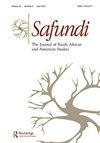1972 - 1986年美国反种族隔离制裁运动的话语
IF 0.2
Q4 AREA STUDIES
Safundi-The Journal of South African and American Studies
Pub Date : 2023-04-03
DOI:10.1080/17533171.2023.2179767
引用次数: 0
摘要
本文章由计算机程序翻译,如有差异,请以英文原文为准。
The discourses of the anti-apartheid sanctions movement in the United States, 1972–86
Abstract The passage of the 1986 Comprehensive Anti-Apartheid Act over the veto of President Ronald Reagan was a stunning victory for US campaigners opposed to apartheid in South Africa. Sanctions against the apartheid regime were first proposed in Congress in 1972 but struggled to build sufficient support beyond veterans of the US civil rights movement. This article argues that the discursive framing around the sanctions issue was important to its construction of a wider coalition of supporters in Congress. Both grassroots organizations and supporters in Congress moved away from a civil rights framing to an anti-communist framing, having briefly experimented with a human rights discourse championed by Jimmy Carter. This article is the first to use a word-scoring method to trace discourse systematically during the fourteen-year period when Congress debated the sanctions issue.
求助全文
通过发布文献求助,成功后即可免费获取论文全文。
去求助
来源期刊
CiteScore
1.00
自引率
0.00%
发文量
0

 求助内容:
求助内容: 应助结果提醒方式:
应助结果提醒方式:


